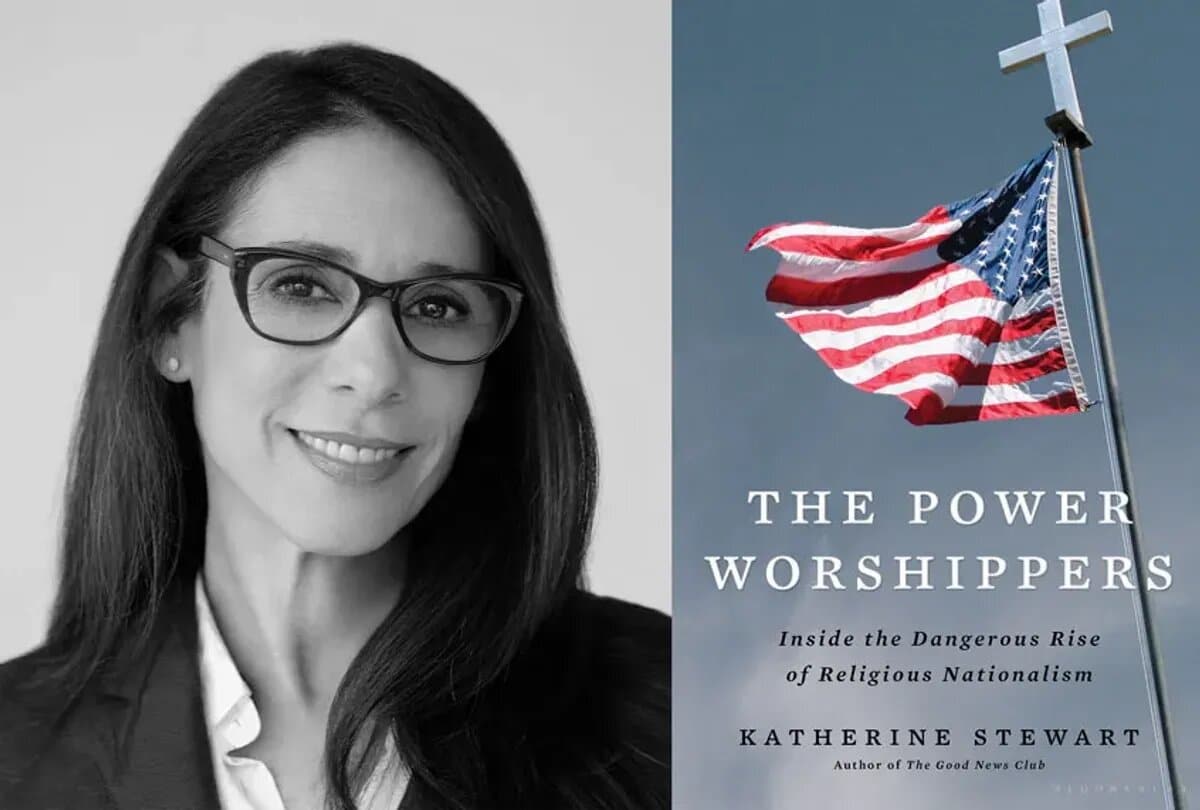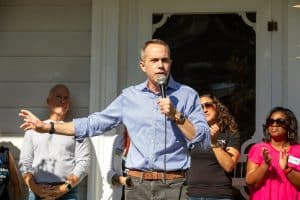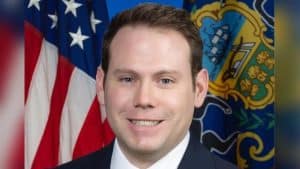When Missouri U.S. Senator Josh Hawley told an audience at the National Conservatism Conference last week that “Christian nationalism founded American democracy” and that he was “advocating for Christian nationalism” as the future of the conservative movement and the country, it marked a very pivotal moment for the nation. Christian nationalism is now mainstream within today’s MAGA Republican Party – and it is ascendant.
Katherine Stewart has been researching and raising the alarm about this his anti-democratic, theocratic movement for at least the last 15 years, writing two very important books on the topic: The Good News Club: The Christian Right’s Stealth Assault on America’s Children and The Power Worshippers: The Dangerous Rise of Religious Nationalism. In fact, Rob Reiner’s new documentary God & Country is based off of The Power Worshippers.
Katherine took some time to sift through the revisionist history and demagoguery of Hawley’s speech, noting that the “Christian nationalist movement is changing even as it continues to gain power.” She warns that it would be a huge mistake to underestimate this Christian nationalist movement, and moment, we find ourselves in as it represents a very real threat to our democracy.
How significant is it that a sitting U.S. senator, Josh Hawley, publicly and unapologetically declares himself an advocate of Christian Nationalism, suggesting it is what will save both conservatism and the United States? Is it safe to say this is just the latest example of how the movement is now increasingly mainstream within the GOP?
This is a big deal, or it should be. A speech like this from a Republican senator would not have been possible 20 years ago. Hawley isn’t offering the old-school grievances of the religious right about a handful of social issues, like gay marriage and abortion. He is talking about ending American democracy and instead imposing his preferred religion through the power of government. Christian nationalism has always been an anti-democratic, theocratic, and authoritarian movement at its core; Hawley is openly embracing the project.
The dominant wing of the Republican party today, the MAGA movement, is in the process of demolishing what is left of the old Republican mainstream. Hawley’s speech is useful in that it tells us that the dominant wing of the GOP is deeply committed to Christian nationalism, and that it is willing to go to war with what he and his fellows often derisively call “Bush/Romney Republicans.” or simply “RINOs.”
A further interesting point here is the global angle. Hawley’s particular form of religious nationalism looks a bit more like French nationalism than even Trump and MAGA in its earlier iterations. He combines familiar tropes of Trumpian nationalism – nativism, bigotry – with economic ideas largely stolen from the left. Like the French populists, he is calling for higher taxes on the wealthy, family-sustaining wages, and stronger protections for the workforce. But in America, as long as that kind of economic populism is being pushed by anyone who is identified with the Republican Party, it is nothing but a fraud. The GOP and the majority of its Christian nationalist elements are committed to hard right economic policies that are intensifying economic inequality and making it so much harder for so many American families to succeed.
READ: Legislating Inequality: The Christian Confederate Roots of Project 2025
This includes J.D. Vance, by the way. The story he tells in his 2016 memoir, Hillbilly Elegy, is one of decline of America’s industrial economy and its toxic effects on working class social norms. But he neglects to properly explore the role of wealthy business actors who have seized control of America’s natural resources, destroyed unions and undermined living wages, creating a winner-take-all economy. He seems to gloss over the reasons for staggering losses of wealth among working Americans in the wake of the financial crisis of 2007-2009 – a crisis brought about by risky practices among large financial institutions and lax regulation. In fact, J.D. Vance takes money from libertarian, regulation-hating, union-destroying billionaires like Peter Thiel. Whatever J.D.’s rhetoric may be as he campaigns as Trump’s VP pick, we can be sure that a second Trump administration will not address the root causes from which these problems emerged. In fact, if you look at Project 2025 and recent decisions by the right-wing Supreme Court, such as the one that struck down the Chevron Doctrine, you can see that it will be committed to even further deregulation and erosion of rights for the workforce.
Hawley articulates in his speech this Augustinian origin story of Christian nationalism “A Christian nationalism organized around Christian ideals, a nationalism driven not by conquest but by common purpose, animated not by fear, but by common love” and suggests Augustine’s vision is actually what birthed both western civilization and in particular the United States. He spends quite a bit talking about this. Is this historically accurate? If not, what does he omit or manipulate?
This is fantasy history. Fascist movements always invent a golden age of the past with which to contrast the decadent present. Hawley is unique – and frankly bizarre – in trying to anchor his golden age to the fourth-century theologian Augustine. A quick reminder: the Dark Ages are generally dated from the fifth century. If Hawley wants to bring us back to the Dark Ages, he should make that his slogan.
Weirdly, a part of Hawley seems to really believe in this schlock history. In a piece he wrote several years ago, he said everything started to go downhill with Pelagius – another Fourth Century theologian who believed (horrifically, in Hawley’s view) that human beings have a free will and that the way they earn the blessings of God is to choose to do good things on earth. Augustine believed that only the grace of God can save us and denounced Pelagius as a heretic. Augustine was also very much in favor of persecution of heretics (to be fair, he didn’t favor killing them, he just wanted to oppress them until they came to their senses). So does Hawley want to make America great by bringing back a form of the Inquisition? Or does he want the crusades or serfdom? Who knows.
READ: Why Samuel Alito’s Christian Nationalist Flag Matters
Weirder still, Hawley does not appear to have read (or understood) Augustine. He seems to think that Rome and Europe ever since, at least until the woke libs started setting up DEI offices, was what Augustine had in mind for “the City of God.” But Augustine wrote a big long book in which he contrasts the City of God with the City of Man, or the earthly city, by which he means Rome and every other corrupt and temporal polity that is concerned with improving material well-being here on earth. The City of God is for the community of believers, and it is expressly concerned with spiritual matters, not material matters. Yes, Augustine assures us, eventually the City of God will triumph over the City of Man – that that is going to happen nearer the end of history than the beginning. So much for the golden age origins of Hawley’s pre-medieval-style fascism.
It’s worth adding that even among the crew of Christian nationalist historian-mythmakers, Hawley is carving out a particularly unique narrative. The more conventional version of the Christian nationalist myth says that America’s founders were all devout Protestant evangelical Christians who thumped their Bibles every morning before writing things like the Declaration of Independence and the U.S. Constitution. That is untrue, of course – America’s Founders were overwhelmingly representatives of the Enlightenment tradition – but it at least has some superficial plausibility compared with the idea that they were thumping the works of a fourth century theologian canonized by the Catholic Church.
Hawley’s arguments for “religious liberty” or “freedom of conscience” are particularly mendacious. His logic – if that is the right word — is that the Christian religion is the only viable foundation for religious liberty; therefore, we must impose the Christian religion through the power of government. Well, Augustine would beg to differ – he thought heresy was sin worth persecution. In contrast, America’s Enlightenment-friendly Founders, who played a critical role in establishing religious freedom, insisted on a freedom from the kind of political religion that Hawley advocates.
Hawley also says, “God, work, neighborhood, home: the great affections of the West. They are dissolving before our eyes.” What is the significance of this phrasing?
Sometimes I wonder if Hawley is just trying to bait us into comparing him with other authoritarians. Then I think, nah, it just comes naturally to him. I hate to point this out, but the German nationalists in earlier decades of the previous century were doing something pretty similar when they invoked words like blut, boden, and heimat (blood, soil, home or homeland). They were big on certain kinds of family values (relegating women to Kinder, Kuche, Kirche, or children, kitchen, church) and kids were herded into youth groups et cetera. The idea was to identify the nation with a particular land and type of people. And that is what Hawley is doing. He is doing it for the same reason, by the way: because this is how you demagogue your way to political power in a divided and unstable society. You come to power by promising to make those other, different, “bad,” demonic people conform to “our” values – or else.
He also offers a spin on the Great Replacement Theory, in his version it isn’t about replacing the white race with brown and Black foreign-born people, but the “Left” replacing the country’s alleged historical Christian faith with a new secular religion borne from secular progressive ideals of DEI and LGBTQ acceptance, and that this is what is destroying the country? Explain the gravity of this narrative of victimhood and persecution?
All fascist movements depend on the demonization of a backstabbing “elite.” Hawley does not disappoint. The “woke libs” in his ideology play the same role that the Jews and other groups have in other fascist ideologies: Hawley casts them as devious, demonic, united in their depravity, yet somehow secretly in control of everything and hell-bent on harming the authentic folk.
Ironically, the people he castigates as “woke libs” are a very large group that includes many different religious and political orientations, and who are hardly united in their views.
READ: Former Terrorism Official Exposes Threat of Christian Extremism
It all points to another pretty obvious contradiction that runs through Hawley’s speech. Christian nationalism is supposed to be about “love,” he says. But Hawley appears to have no love here for anyone to the left of him, no effort to understand, no desire for compromise. “They” must be destroyed, Hawley implies, before they destroy the nation.
Do you have anything else to add, anything you feel should be highlighted or that people should maybe take from this?
This is a good taking stock moment. The Christian nationalist movement is changing even as it continues to gain power. But a lot of outsiders haven’t caught up. They still think it’s all about a bunch of aging reactionaries complaining about a few social policies. It isn’t. This is an authoritarian political movement, and it represents a threat to our democracy.







